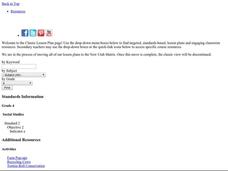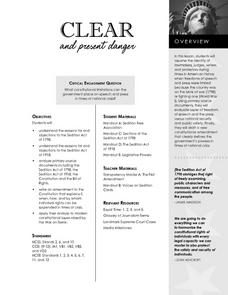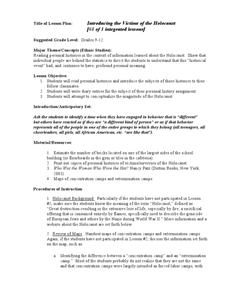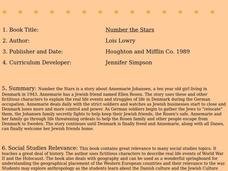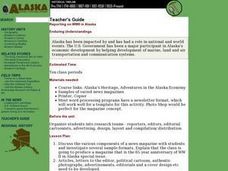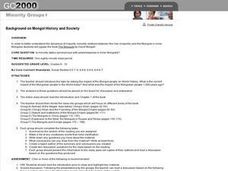Curated OER
Who Freed the Slaves During the Civil War?
Pose the question to your historians: who really freed the slaves? They critically assess various arguments, using primary sources as evidence. In small groups, scholars jigsaw 5 primary source documents (linked), and fill out an...
Curated OER
Making a Brand for Ourselves the "Cowboy" Way
Fourth graders research the history of Utah. Students explore westward expansion and the importance of ranching in Utah's history. Students also investigate cattle drives in Utah.
Facing History and Ourselves
How Do Others Define Your Identity?
Sixth graders examine the relationship between the individual and society. In this World History instructional activity, learners read a book that discusses labels put on individuals. Students create a story board in relation to the book.
Curated OER
Rites of Passage
Students, through video and Internet activities, are exposed to rites of passage in two modern day West African cultures, the Fulani and the Dogon, and how slavery served as a rite of passage for many West African people in the past.
Curated OER
Can You Hear Me Now?
Students explore the industry involving communication and put communication devices into activities. In this communication lesson plan, students put items into chronological order, review primary sources, compare and contrast items, and...
Curated OER
On the Road Again
Students examine migration patterns in Africa and China. They watch excerpts from a documentary, define key vocabulary words, complete various student organizers, and create a poster.
Curated OER
Unit on Gandhi and Ahimsa
Students explore the history of Gandhi and his viewpoint and example of nonviolence. In this World History lesson, students complete numerous research assignments and activities over the course of nine lessons to expand their knowledge...
Curated OER
The Sounds of Change
Students recognize that music brings out feelings and emotions in people. In this music themes instructional activity, students explore the relationships between culture and music. Students answer questions about favorite choices in music.
Curated OER
The French Revolution
Tenth graders explore the events leading up to the French Revolution. In this World History instructional activity, 10th graders participate in a class discussion as the teacher shares a Powerpoint presentation, then the students rewrite...
Curated OER
GANDHI'S INDIA
Students describe key events in the life of Gandhi. They determine why knowledge of geography is necessary to understand the history of the people in a place or region. They write a summary of how the events in Gandhi's life,...
Facing History and Ourselves
What Does It Mean to Belong?
After reading and analyzing The 'In' Group by Eve Shalen, sixth graders consider how the categorization of people results in exclusion, discrimination, and injustice.
Curated OER
Modern Conditions Placed on Traditions
Students explore the role of traditions in world cultures. They read a New York Times article dealing with recent changes in the traditional clothing worn in England's House of Lords
Curated OER
Dear Mrs. Roosevelt
Students develop an understanding of how the Great Depression impacted people. In this writing, analyzing and cooperative groups lesson, students inquire about the Great Depression. Students identify problems children faced during this...
Curated OER
Clear and Present Danger
Students assume identities of lawmakers, judges, writers, and protestors during times in American history when freedoms of speech and press were limited because country was on the brink of war or fighting one. Students use primary source...
Curated OER
Lesson 3. No One Spared
Eleventh graders, in groups, explore the devastation that World War I inflicted on millions of people around the world. They write a first-hand account of the impact of World war I.
Curated OER
Struggling To Survive: Life In Sarajevo
Young scholars gain an understanding of the impact that wars have on society. They use Web sites to gain information about Sarajevo, create characters using what they learn from watching video clips and viewing news footage online and...
Curated OER
Who Were the Dissidents?
Students discover how Japanese dissidents spoke out against the injustice practiced in Imperial Japan. In this Japanese history lesson, students listen to a lecture about the silent dissidents in the nation prior to World War II and the...
Curated OER
Holocaust Unit
Students read a book about World War II and the Holocaust while in small literature circles. They write journal entries and news articles based on the reading.
Curated OER
Introducing the Victims of the Holocaust
Students consider the plight of Holocaust victims. For this World War II lesson, students discuss the number of Jews who were persecuted during the war and read biographies by Holocaust survivors. Students compose essays on personal...
Curated OER
Number The Stars
Students read a book about prejudices that occur in our daily lives. They describe characters in the book. Students discuss real life events of World War II and the Holocaust. Students simulate hiding Jews from the German soldiers. ...
Curated OER
Reporting on WWII in Alaska
Students explain the people and the political, geographic, economic, cultural, social, and environmental events that have shaped the history of the state, the United States, and the world.
Curated OER
Push/Pull factors in Immigration
Students explore the push/pull factors experienced by immigrant families. They interview a parent and an American about their family's immigration history. Students write a summary of the interview and compare the push/pull factors of...
Curated OER
Background on Mongol History and Society
Students discuss the impact of the Mongols on history. In groups, they read a different component to the relationship between the Mongols and Han. They summarize what they have read, identify any questions they have and develop their...
Curated OER
Introduction to the Early Origins of the Cold War
In this Cold War worksheet, students read a 4-paragraph selection about post World War II diplomacy and then list key dates and events noted in the selection.



